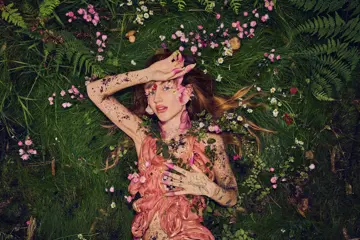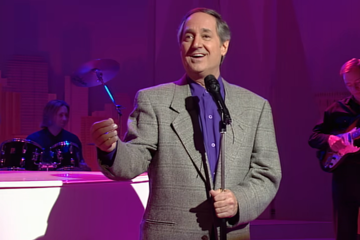 Coda Conduct
Coda ConductCanberra-born, Sydney-based rap duo Coda Conduct laugh most at the unexpected. “Things that come out of nowhere definitely make me laugh,” Sally Coleman, one half of the group, begins.
That sense of the unexpected goes hand in hand with other things that make Erica Mallett laugh too: the surreal, and improvisational humour. “Thinking on your feet and having to adapt to a situation makes me laugh a lot,” she says.
Freestyle rap is always funny to Mallett. “The times that I’ve tried to freestyle, I end up just nearly pissing myself laughing,” she says.
“There’s something deep within me that just comes out when I freestyle, and it’s just really sexual and intense."
There’s something revealing about what comes up when someone is put on the spot in a freestyle. While Coleman always ends up rapping about food, she points out that Mallett’s freestyles are always “graphically sexual”.
“There’s something deep within me that just comes out when I freestyle, and it’s just really sexual and intense,” Mallett admits.
Both Coleman and Mallett reckon their sense of humour developed because of the way they grew up – in families who banter a lot. It’s the humour that comes up in a conversation where you’re trying to one-up each other, to push the joke further and further, but to do so without breaking into laughter yourself.
“I think we both grew up with that family environment where you’re trying to have the last laugh, like literally have the last laugh,” Coleman says.
That urge to push at the boundaries of an idea, to one-up each other in conversation, as Mallett notes, just comes naturally to the pair. The current hosts of triple j’s Weekend Arvos, who will take over the triple j Breakfast slot in 2020, find their conversations in real-life or on the radio can “get pretty bizarre”.
Don't miss a beat with our FREE daily newsletter
But sometimes they forget that a regular triple j listener may not be used to that way of talking. It’s part of what makes their style of radio feel so authentic, like you’re chatting to your mates at the pub.
“I think both of us usually would use dry humour, keep a straight face, keep one-upping each other,” Coleman says. “People will text in being like, ‘I can't stop laughing,’ and both of us are just like, ‘What? That was just a normal conversation. We weren't trying to be funny.’”
Both women recall early memories of laughing with their families. Mallett remembers her older brother playing pranks on her young brother, or on their family dog. “I laughed so much growing up, because my two brothers are so funny,” she says.
Coleman vividly remembers the moment her mum, standing at a supermarket checkout, kids in tow, rummaged in her bag to pick up a phone call. “And she just pulled out a muesli bar and answered it.”
Her mum was so embarrassed she rushed the family out of the supermarket, while unable to contain her own laughter. “So, as a family, we all just sat there while mum cry-laughed at having answered her muesli bar in front of the checkout chick.”
Both their families also use humour to overcome conflict, cope with stress, and process grief. “We’re always laughing about anything, even if we’re all in bad moods,” Mallett says.
Coleman describes how making a joke after an argument is a way to reset the conversation. “It draws a line in the sand, it changes the tone, it changes the mood,” she says. “It’s like, ‘Apology accepted,’ or ‘I’m ready to move on,’ and you make an effort consciously to make the other person laugh.”
Seeing kids fall over, or get hurt, is Mallett’s guilty pleasure. She fears that, if and/or when she becomes a mother, she “will not be a nurturer” and would instead “point and laugh” at her own child falling over.
In the 24 hours before we speak, just days out from their run of dates supporting Elefant Traks label-mates Horrorshow, Coleman was set off by a video Mallett sent her of a small child falling down a manhole. The viral clip combines all the integral elements of something funny: an injured child, an unexpected event, a mother’s panic. “The kid is obviously ok, which is what makes it all fine to laugh. It’s a beautiful piece of slapstick comedy.”
Mallett brings up a more niche sub-area of kids getting injured: when they hurt themselves jumping on trampolines. “You can fall through the trampoline and then also you can get flung up in the air if you do it wrong. And always, if there’s two people, it’s extra dangerous and extra hilarious.”
We reminisce about the trampolines of the ‘90s and early ‘00s – bare metal and sharp springs, no padding. Bouncing on one of those “was just how you got tough”, Mallett deadpans.
Coleman, meanwhile, can’t go past the joy of fart noises. “Farts really genuinely gives me the giggles,” she says. “I just love them.”
"If someone farted at a funeral I would die. I'd be in the coffin.”
She struggles to stifle laughter while she tries to articulate how entertaining farts can be, and why. “The idea of how socially uncomfortable it is to fart in front of people, you know?” she explains “And the more inappropriate the setting the funnier it is. If someone farted at a funeral I would die. I'd be in the coffin.”
“I can’t believe that this is what’s making you laugh this much,” says Mallett.
A sense of humour is inextricable from the way Coda Conduct make their music. For Mallett, it’s just how she connects with people, and adding a sense of levity to her songwriting is a way to make people smile or think or relate.
“It’s just my style of communication. If I weren’t to do that, I’m not sure how I’d feel like I was connecting with people or even connecting with myself through my music.”
As an approach to songwriting, it’s about zeroing in on what it is they want to talk about, whether it’s a relationship or a life event or something else. “Then, in the process of writing about it, it feels inauthentic not to include the humorous parts as well,” Coleman says.
She points to Coda Conduct’s March single, The Monologue, from their upcoming EP, Other People’s Problems, out this month. Mallett raps, “I do not want to hear about Elon Musk again.”
“People find it humorous because they relate to it,” Coleman says. “Or like they go like, 'Oh my God, I know that person,' or it's so bizarrely specific as to be amusing. But really, it's just a way of connecting with people.”
Adelaide rapper Allday treads a similar line. This year's Don’t Wanna Push You Away Anymore features the lyric: “We had the one mug/We could both drink, just not both at once.”
“I find that line so funny,” Coleman says.
“But it’s also really beautiful, don’t you think?” Mallett interjects. “It’s funny, but it’s really poetic. It’s a hard line to find – when you’re saying something that’s touching but also relatable but also funny.”
“It feels really genuine, really real,” Coleman continues. “Like humorous, but also kind of weird and bittersweet and nostalgic. And I love being able to do that kind of songwriting where something's funny, but it doesn't have to be crass and it doesn't have to be dumb – even though that stuff is all fine too. The best humour I think is poignant humour.”















